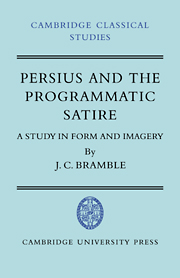Book contents
- Frontmatter
- Contents
- PARENTIBUS OPTIMIS
- APPENDIX 1 Accius and Pacuvius at Persius I. 76–8
- APPENDIX 2 Virgil and the moderns at Persius I. 96
- APPENDIX 3 The image of the child in ancient satire and diatribe
- APPENDIX 4 The disclaimer of malice
- TEXT
- TRANSLATION
- 1 INDEX OF MODERN AUTHORS
- 2 INDEX LOCORUM POTIORUM
- 3 INDEX OF IMAGES, TOPICS AND WORDS
APPENDIX 2 - Virgil and the moderns at Persius I. 96
Published online by Cambridge University Press: 05 June 2014
- Frontmatter
- Contents
- PARENTIBUS OPTIMIS
- APPENDIX 1 Accius and Pacuvius at Persius I. 76–8
- APPENDIX 2 Virgil and the moderns at Persius I. 96
- APPENDIX 3 The image of the child in ancient satire and diatribe
- APPENDIX 4 The disclaimer of malice
- TEXT
- TRANSLATION
- 1 INDEX OF MODERN AUTHORS
- 2 INDEX LOCORUM POTIORUM
- 3 INDEX OF IMAGES, TOPICS AND WORDS
Summary
I have recently touched on the attitude of the ‘moderns’ to Virgil. Who precisely were these moderns, and why did they scorn the Aeneid? The first question involves the history of mannerism in Rome. Firstly there is the problem of original Roman contact with Alexandrianism, and more specifically, Callimacheanism. Ennius, Catulus and Lucilius seem to have been acquainted with Callimachus: Ennius with his dream at the beginning of the Annales, and his claim to be a polished modern at 214–16 V, Catulus with his adaptation of Callim. Epigr. XLI at fr. 1 M, and Lucilius with his knowledge of Callimachean literary theory. Next, there is the question of Ciceronian poetic practice, and Ciceronian taste, both of them relative factors. He seems to have gravitated away from modernism towards conservatism: in poetry, away from (probably) the ἔπος τυτθόν and Aratus, towards a more grandiose hexameter manner; in taste, towards antipathy against the novi of his later years, with concomitant admiration for the veteres. Of course, ‘old’ and ‘new’ have no absolute sense: the terms at this stage are entirely relative. All we can say of the traditional ‘poetae novi’ of the older literary histories, from Ciceronian evidence at least, is that a group of moderns shared certain metrical traits – the σπονδϵιάЗοντϵζ described in the reference to οἱνεώτεροι at ad Att. VII. 2.I, in November 50 B.C., and the regard for final s in prosody, mentioned at Or. 161, six years later, in 44 B.C.
- Type
- Chapter
- Information
- Persius and the Programmatic SatireA Study in Form and Imagery, pp. 180 - 184Publisher: Cambridge University PressPrint publication year: 1974
- 1
- Cited by

